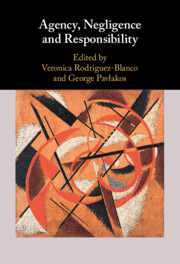Book contents
- Agency, Negligence and Responsibility
- Agency, Negligence and Responsibility
- Copyright page
- Dedication
- Contents
- Figures
- Contributors
- Acknowledgements
- Introduction
- Part I Will and Blameworthiness
- Part II Agency, Reasons and Inadvertence
- Chapter 5 The Possibility of Pure Negligence
- Chapter 6 Agent-Relativity without Control
- Chapter 7 The Boundaries of Negligence
- Chapter 8 The Backward-Looking Puzzle of Responsibility in Negligence
- Chapter 9 Responsibility and Agency
- Part III The Significance of Action in Negligence
- Bibliography
- Index
Chapter 9 - Responsibility and Agency
from Part II - Agency, Reasons and Inadvertence
Published online by Cambridge University Press: 28 October 2021
- Agency, Negligence and Responsibility
- Agency, Negligence and Responsibility
- Copyright page
- Dedication
- Contents
- Figures
- Contributors
- Acknowledgements
- Introduction
- Part I Will and Blameworthiness
- Part II Agency, Reasons and Inadvertence
- Chapter 5 The Possibility of Pure Negligence
- Chapter 6 Agent-Relativity without Control
- Chapter 7 The Boundaries of Negligence
- Chapter 8 The Backward-Looking Puzzle of Responsibility in Negligence
- Chapter 9 Responsibility and Agency
- Part III The Significance of Action in Negligence
- Bibliography
- Index
Summary
A well-known tradition in private law theory says that one is responsible for the outcomes of one’s negligence when those outcomes are connected with one’s agency in the right way. Though they differ on the detail, theorists within that tradition (exemplified in the work of Tony Honoré, Stephen Perry, Joseph Raz, and John Gardner) tend to agree that a story about what we are responsible for must be grounded on a story about who we are, and what we are like as agents. In their view, you are responsible to make repair for the consequences of your careless driving insofar as not ascribing such responsibility to you would fail to treat you appropriately as an agent who has certain general capacities and commands the normal range of rational powers, including the power to take up driving and to make driving decisions. This chapter identifies three problems with such ‘agency’ accounts. First, those accounts have difficulty explaining why the connection with agency seems to matter more in some contexts, e.g., in blaming, and less in others, e.g. in the allocation of substantive burdens among persons. Second, they lack the resources to help us decide whose responsibility it is to deal with some outcome when more than one agents are connected to that outcome in the ‘right’ way, e.g., when a malicious attacker and the speaker he targets could both have avoided the speaker’s injury by choosing appropriately. Third, their implicit claim that our ideas about agency are more basic or fundamental than our ideas about responsibility is not obviously correct.
Keywords
- Type
- Chapter
- Information
- Agency, Negligence and Responsibility , pp. 167 - 184Publisher: Cambridge University PressPrint publication year: 2021

